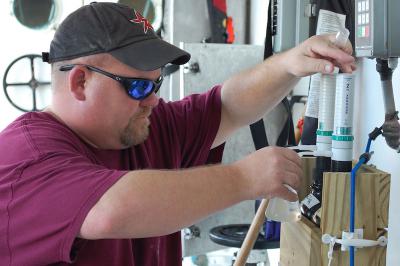Title
Planning and Carrying Out Investigations
Scientists and engineers seek to systematically describe the natural world and develop and test explanations about how the world works. In order to test these explanations, scientists and engineers plan and design investigations. Scientific and engineering investigations must be designed to answer specific questions or test specific hypotheses. Relevant variables must be identified and plans must be made to observe, measure, and control these variables. Scientists and engineers must also decide what levels of precision and accuracy are appropriate and determine ways to reduce error. After designing investigations, scientists and engineers must carefully carry out these investigations.
In marine and aquatic science, scientists plan and carry out a wide range of experiments. These experiments may be carried out in laboratories or in the field. Scientists may use low or high tech instruments, including everything from rulers and thermometers to genome sequencing machines and mass spectrometers. In Fig. 1, a scientist at sea prepares a sample to be analyzed for dissolved oxygen.
Image caption
Fig. 1. A scientist adds chemicals to a water sample from the Gulf of Mexico aboard the National Oceanic and Atmospheric (NOAA) Ship Pisces. The sample will be analyzed to determine levels of dissolved oxygen.
Image copyright and source
Image courtesy of National Oceanic and Atmosphere Association (NOAA) National Ocean Service
Image caption
Fig. 2. Ecologists using a quadrat to sample and count intertidal organisms.
Image copyright and source
Image by Kanesa Duncan Seraphin
Students should, according to the framework, be able to formulate appropriate questions and hypotheses, determine what data are needed and how to collect these data, set appropriate limits of precision and accuracy, plan research procedures, and determine how to minimize error. These skills should build from elementary through high school. In order to learn how to plan and carry out investigations, students should be given opportunities to design investigations, both in the laboratory and in the field.
-
Grade 3
> Physical Science
> The Forces of the Wind
-
Grade 3
> Physical Science
> The Forces of Waves
-
Life Science
> Ecosystem Cycling
> Activity: Aquaponics in a Bottle
-
Grade 4
> Earth and Space Science
> Weathering and Erosion
-
Grade 4
> Life Science
> Structure to Function
-
Grade 5
> Life Science
> Materials for Plant Growth
-
Grade 5
> Life Science
> Materials for Plant Growth
-
Grade 5
> Physical Science
> Matter in the Sea










